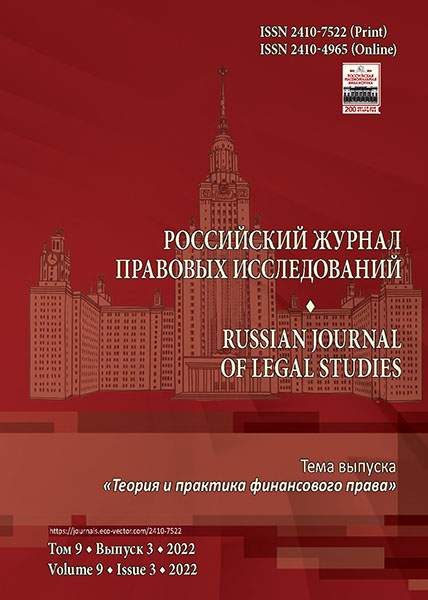Features of Recognition of Citizenship of the Russian Federation
- 作者: Piryazeva N.E.1
-
隶属关系:
- Institute of Legislation and Comparative Law under the Government of the Russian Federation
- 期: 卷 9, 编号 3 (2022)
- 页面: 23-29
- 栏目: Constitutional Law
- ##submission.dateSubmitted##: 08.08.2022
- ##submission.dateAccepted##: 18.08.2022
- ##submission.datePublished##: 25.10.2022
- URL: https://journals.eco-vector.com/2410-7522/article/view/109673
- DOI: https://doi.org/10.17816/RJLS109673
- ID: 109673
如何引用文章
详细
Presently, the Russian Federation is characterized by the transformation of migration processes. The difficult political and military situation in various territories of the post-Soviet space and issues related to assisting in the resettlement of compatriots living abroad determine the liberalization of migration policy. The migration policy of the Russian Federation can be directed toward ensuring the simplicity of procedures and the clarity of the conditions for acquiring citizenship. The development of legislation on citizenship led to the formation of new approaches by the legislator to the regulation of certain aspects of its acquisition. In particular, draft law No. 49269-8 “On Citizenship of the Russian Federation”, which passed the first reading in the State Duma of the Russian Federation, proposes expanding the practice of recognition as citizens of the Russian Federation. Within the framework of this article, drawing on the experience of recognizing residents of the Republic of Crimea and the federal city of Sevastopol as citizens, the legal nature of the institution of recognition is analyzed. The author concluded that it is urgent to simplify the acquisition of citizenship and develop a mechanism for recognizing as citizens of the Russian Federation persons living in the country, but having limited basic social, political, and economic rights due to their lack of citizen status. At the same time, according to the author, the practice of simplifying the acquisition of citizenship as much as possible would not only have a positive effect in the form of protecting the rights of a significant category of persons in need of security and stability, but may also lead to the annulment of citizenship status after additional checks by authorized bodies justification for issuing Russian passports. Thus, mass recognition of citizens of the Russian Federation would result in certain risks for state security, which should be taken into account by both the legislator and the law enforcement officer.
全文:
作者简介
Natalia Piryazeva
Institute of Legislation and Comparative Law under the Government of the Russian Federation
编辑信件的主要联系方式.
Email: natalieko97@gmail.com
ORCID iD: 0000-0001-6930-5636
Postgraduate
俄罗斯联邦, Moscow参考
- Grenaderova KM. Grazhdanstvo kak element konstitucionno-pravovogo statusa lichnosti v RF. Nauchnoe obespechenie agropromyshlennogo kompleksa: sbornik statej po materialam 71-j nauchno-prakticheskoj konferencii studentov po itogam NIR za 2015 god. Krasnodar, 12 aprelya 2016 goda, Ministerstvo sel'skogo hozyajstva RF; FGBOU VO «Kubanskij gosudarstvennyj agrarnyj universitet imeni IT. Trubilina». Krasnodar: Kubanskij gosudarstvennyj agrarnyj universitet, 2016. P. 727–730 (In Russ.).
- Kajbysheva DE. Osnovaniya i poryadok priobreteniya grazhdanstva Rossijskoj Federacii. Mezhdunarodnyj zhurnal gumanitarnyh i estestvennyh nauk. 2020;(6-3):92–94. (In Russ.).
- Koryakovcev VV, Pitul'ko KV. Kommentarij k Federal'nomu zakonu «O grazhdanstve Rossijskoj Federacii». Saint-Petersburg: Piter, 2003. 526 p. (In Russ.).
- Kirienko VS. Osobennosti priobreteniya grazhdanstva Rossijskoj Federacii na territorii Respubliki Krym. Razvitie gosudarstvennosti i prava v Respublike Krym : Materialy Vserossijskoj nauchno-prakticheskoj konferencii, Krasnodar, 05 fevralya 2016 goda. Pod obshchej redakciej SA Butkevicha. Krasnodar: Krasnodarskij universitet MVD Rossii, 2016. P. 341–343. (In Russ.).
- Krylov SB. Option and plebiscite and the beginning of self-determination in Soviet international treaties. Soviet law. 1923. P. 43–55. (In Russ.).
- Mesheryakov AV. Russian citizenship for residents of Crimea and Sevastopol: some results of the transitional period. Constitutional and international law. 2015. P. 36–41. (In Russ.).
- Krinicyn IO. Priobretenie grazhdanstva v sootvetstvii s principom pochvy. Molodezhnyj nauchnyj potencial v yurisprudencii XXI veka: ot teorii k praktike: Sbornik statej III Vserossijskoj mezhvuzovskoj studencheskoj nauchnoprakticheskoj konferencii, Moskva, 14 oktyabrya 2020 goda. Moscow: Rossijskij gosudarstvennyj gumanitarnyj universitet, 2020. P. 107–114. (In Russ.).
补充文件






